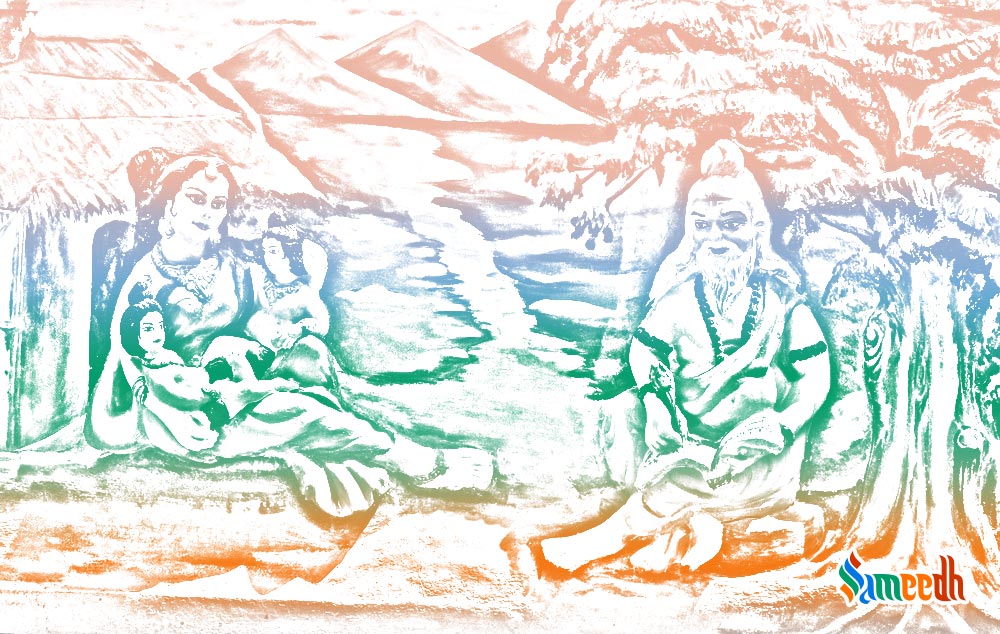Valmiki is traditionally regarded as the author of the ancient Indian epic, the Ramayan, and is often referred to as the first poet or Adi Kavi (Adivaki). His role in Indian culture and literature is monumental, as he is credited with composing the first literary work in the Sanskrit tradition, setting a foundation for epic poetry.

EARLY LIFE
Born in the Treta Yug
Valmiki was born to a brahmin family in the treta yug. He was born to Pracheta and named Ratnakara. He is known to have gotten lost in the woods during his childhood and gained excellency in hunting. Due to certain circumstances he started robbing. During his time as a robber, he bumped into a Narad Muni who changed his life and perspective towards how to lead a life. His meeting with the saptarishis also changed the course of his life and inspired him to turn into the great sage who authored the epic, Ramayan.
Valmiki’s own life story is one of redemption. He was once a highway robber named Ratnakar, but through a transformative encounter with the Narad, he gave up his life of crime, meditated deeply, and eventually became a great sage. After years of penance, Ratnakar became enlightened and was reborn as Valmiki, the poet-saint who would compose the Ramayan. His story is symbolic of the transformative power of meditation and devotion.
LIFE EVENTS AND CONTRIBUTION TO SOCIETY
- Title of Adi Kavi:
- The term Adi Kavi means “the first poet,” and Valmiki holds this title because he is believed to be the first to compose a poem or shloka (verse) in the structured form of Sanskrit poetry.
- The shloka he composed became the foundational meter for Sanskrit poetry, known as the Anushtubh meter (a quatrain with 32 syllables).
- The Birth of the First Poem:
- According to legend, Valmiki’s transformation into the first poet occurred in a moment of profound empathy and grief. While observing the serene beauty of nature by the Tamasa River, Valmiki witnessed a hunter killing one of a pair of mating cranes. The female crane was left grieving for her slain mate.
- Overcome by compassion and sorrow, Valmiki spontaneously uttered a curse in rhythmic verse:
“Mā niṣāda pratiṣṭhām tvam agamaḥ śāśvatīḥ samāḥ,
yat krauñcamithunād ekam avadhīḥ kāmamohitam.”
(O hunter, you shall never find rest for all eternity, for you killed one of a pair of loving birds.) - This shloka is considered the first verse of poetry, born out of Valmiki’s deep emotional response to the suffering of the bird, making him the Adi Kavi.
- The Ramayan and Valmiki’s Role:
- After this experience, Valmiki, under the guidance of the god Brahma, was inspired to compose the Ramayan, which tells the story of Lord Ram’s life. This epic, written in 24,000 verses, is one of the most revered and influential texts in Indian culture. It is said that Valmiki had a vision of Lord Brahma asking him to write the epic in the form of beautiful shlokas. In fact the first shloka that came out of Valmiki was a cry of grief due to him witnessing a couple of cranes dying due to an arrow shot by a hunter. The shloka came out in Sanskrit language as a cry of shock and agony he experienced by witnessing the painful sight.
- The Ramayan is not only a spiritual and moral guide but also a literary masterpiece, weaving together themes of dharma (righteousness), devotion, love, and the triumph of good over evil.
- One of the most fascinating facts about Sage Valmiki is that he authored the epic of Ramayan and also played an important role in the story. In Uttarkand, when Sita was asked to leave the palace and live in the forest, she takes shelter in the ashram Sage Valmiki. It is during her stay at the ashram, Sita gave birth to her two sons Luv and Kush. The two boys became the disciples of Sage Valmiki and learnt Ramayan. The role played by Valmiki goes beyond the role of just an author of the epic.
- Valmiki and the Adivasis (Indigenous People):
- In many cultural interpretations, Valmiki is sometimes connected to India’s indigenous or tribal communities (Adivasis). His origin as Ratnakar, a man living in the forest and engaging in banditry, symbolizes a connection to the tribal lifestyle and the wilderness, much like the Adivasis.
- Some interpretations consider Valmiki to be a figure who bridges the divide between the so-called “civilized” society and the natural, indigenous world, highlighting the potential for spiritual growth and wisdom across all walks of life.
- The Maharishi who advised Yudhishtir: He played an important part in the epic of Mahabharat as well by advising Yudhistir to worship Lord Shiv after the war to cleanse himself of the sins committed during the war.
LIFE AFTER MAJOR EVENTS
Worshipped as Lal Beg
Due to the immense and knowledgeable contributions of Valmiki to India’s literature, he is worshipped in some parts of India. A particular section considers him a reincarnation of a god. He is worshipped at various temples in Chennai and Rajasthan as Bala Shah or Lal Beg. His birthday is also celebrated as Valmiki Jayanti in many parts of India.
BOOKS PUBLISHED
Author of Yoga Vasistha
Aside from the famous epic of Ramayan, he is also known to have authored one of the most famous works in Indian mythology, Yoga Vasistha. It celebrates and describes the discourse of Sage Vasistha.
The role played by Valmiki goes beyond the role of just an author of the epic. He played an important role in inspiring the generations to come about the transformation one can go through if they are inspired to change their life and follow the path of dharm.
To read more about such holy souls who have inspired us through the ages, keep reading blog posts on Sameedh.